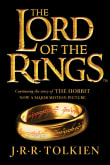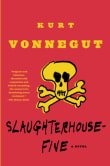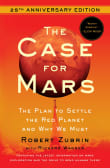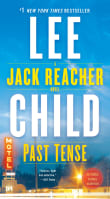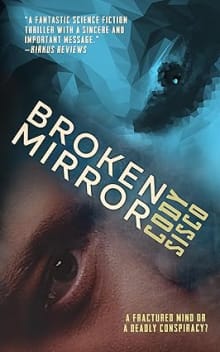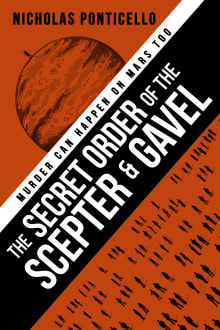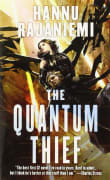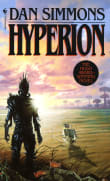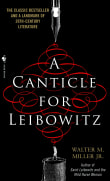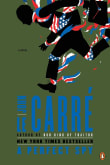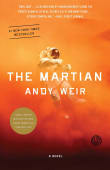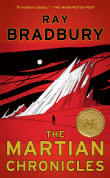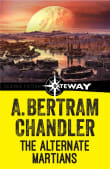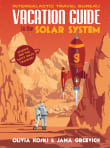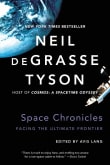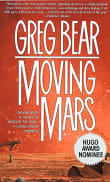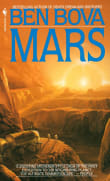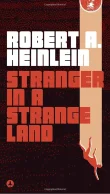Red Mars
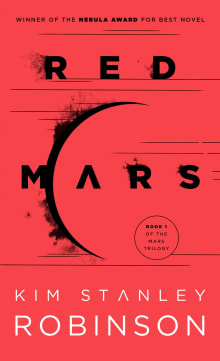
Book description
The first novel in Kim Stanley Robinson's massively successful and lavishly praised Mars trilogy. 'The ultimate in future history' Daily Mail
Mars - the barren, forbidding planet that epitomises mankind's dreams of space conquest.
From the first pioneers who looked back at Earth and saw a small blue star, to…
Why read it?
11 authors picked Red Mars as one of their favorite books. Why do they recommend it?

Another work spanning more than a hundred years and featuring many rich characters, crises, and drama, the Mars Trilogy makes a great summer read. At a little more than 1600 pages, the trilogy is like three seasons of a really engrossing television series.
The trilogy contains ample portions of science, science fiction, politics, and explorations of the human condition. There’s even some boom-boom for those who like a few explosions in their stories. Like my other preferences, there’s little “magic” in the Trilogy’s universe; instead, things mostly make sense after accepting a couple of assumptions. The richness of the characters…
From Perry's list on inspiring depressing books Science Fiction.

One of the best science fiction stories I have read that incorporates accurate descriptions of volcanoes on Mars, along with innovative use of these geologic wonders.
This is the first volume of an award-winning trilogy about the colonization of Mars. Pavonis Mons is a neighboring volcano to the one that I studied in graduate school. The equator of Mars passes through the tall construct of Pavonis Mons; Robinson describes the building and use of a remarkable "space elevator" at the volcano’s summit, providing easy access to orbit without using rockets.
Much of the story centers around personal interactions between the…
From James' list on amazing volcanoes.

When great science fiction strives for scientific credibility, and hits the nail on the head, you end up with a story like this. A hundred people arrive on Mars as the first colonisers, to begin the process of terraforming it for human habitation. The natural environment presents its own dangers, from low atmospheric pressure and unbreathable atmosphere to low gravity and destructive sandstorms. But the challenges don’t stop there. Not everyone has the same vision of the future Martian world, and the resulting conflicts threaten the whole project. The first book of a trilogy, this epic novel is a must-read…
From Tony's list on exploring the dangers of discovering new worlds.
If you love Red Mars...

Red Mars is by far the best Martian colonisation story I have read. In 2027, one hundred scientists land on the surface of Mars, intent on terraforming its frozen wastes. Humanity’s future depends on colonising our solar system, yet the American and Russian teams diverge from the start.
Red Mars is incredibly rich in character and perspective, scientifically credible, and driven by politics. It brings together the best and worst in humanity. I’m on my second paperback copy of this book because I read the first one so many times it came apart. Most of the ‘First Hundred’ have their…
From J.C.'s list on future history with a glimpse of what might happen.

About the colonization of Mars and the interplay of governance and economics, it strongly influenced me. First published in 1992, it includes a historical perspective of the then accepted science and descriptions of Mars. I found the enthusiasm for terraforming to be over-optimistic, but only when I put some numbers on it did I realize by how much. We are now reasonably convinced terraforming is not possible. Nevertheless, it made me more realistic about my Mars stories, so it had a big influence on me. I found it very strong on the social aspects of the settlement, and the conflict…
From Ian's list on sci-fi consistent with scientific principles.

Staying on Mars for the moment, it was tempting to go back to Edgar Rice Burroughs' Barsoom books, or include another Heinlein story, but I'm choosing Red Mars for the sheer technical brilliance Robinson brings to bear. The story meanders a bit for my taste, but Robinson does an amazing job explaining the varieties of technology that would—and maybe one day will?—be necessary to make Mars livable. Everything about it rings true, and the enormous scale of the undertaking is obvious and breathtaking.
Robinson's Mars trilogy also inspired the board game Terraforming Mars, which is possibly my favorite game—so…
From Gray's list on near-future, near-space.
If you love Kim Stanley Robinson...

Hard SF writers need to build believable worlds as seen from a variety of character perspectives. These stories require a ton of research to create the details about how technologies may develop and how cultures might respond to those changes to make the story world credible. When I was researching other hard SF novels written about Mars in the early 1990s, Red Mars was at the top of my list because of its high level of detail and character perspectives. I worked for NASA and am picky about technology projections. Although the technologies have continued to change, the novel…
From Bruce's list on science fiction about Mars colonization.

Once again, science fiction meets science fact in the Mars trilogy by Kim Stanley Robinson, a thoughtful exploration for colonizing Mars. The first novel, Red Mars, gets us there. The second, Green Mars, is a battle for the soul of Mars, with fractions who desire to keep Mars natural pitted against others who desire to make it more earthlike. All the while there's a revolution unfolding between Mars and Earth à la the American Revolution. (Partial spoiler alert: the third novel, Blue Mars, hints at who won.) Should humans ever migrate to Mars, there is little doubt…
From Christopher's list on how to not die on Mars.

The first book of Robinson’s trilogy follows the first hundred settlers of Mars. Similar to Bradbury’s The Martian Chronicles, we see how humanity’s baggage can never be left behind. But Robinson goes much deeper into the issues and the science, and creates a remarkable vision of what may come to be.
From Marc's list on life on Mars as we’ll soon know it.
If you love Red Mars...

Quite a few people, including me, think this is the greatest work of science fiction ever written. It tells the story of the first human settlement on Mars, stretching over three generations. Usually, science fiction, when it’s good, is good at action, at a character, or at technical detail, but not all three (and rarely even two). Amazingly, Robinson is very good at all three. The central conflict stretching through the volumes is whether the settlers should adapt to Mars’s harsh, austerely beautiful environment or, with the aid of tremendous energy inputs, turn it into a version of Earth.
There…
From George's list on making you temporarily forget you’re depressed.
If you love Red Mars...
Want books like Red Mars?
Our community of 12,000+ authors has personally recommended 100 books like Red Mars.




